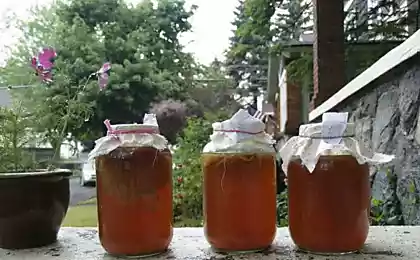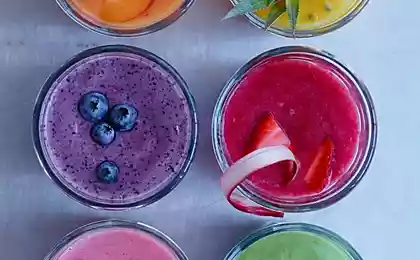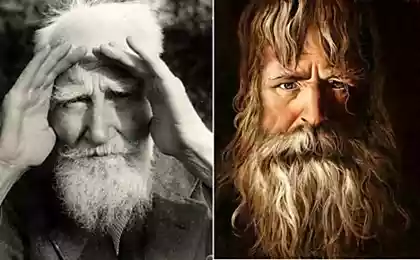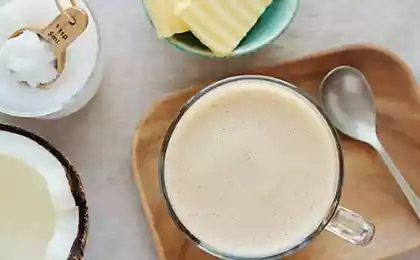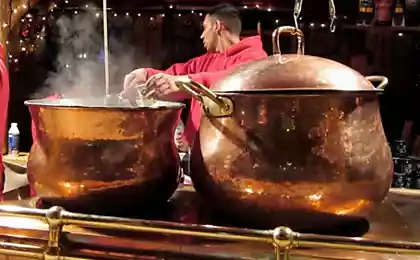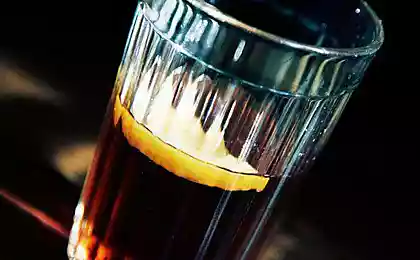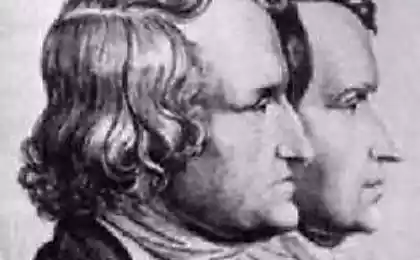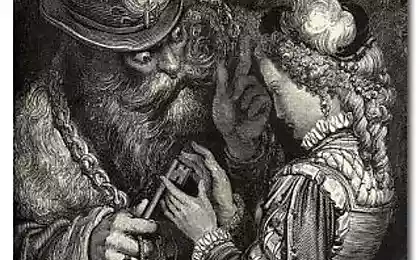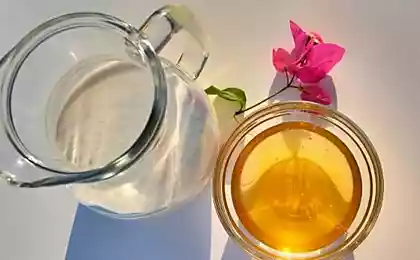927
Favorite drink Bluebeard
The historical prototype of the fantastic character when alleged torture of children of both sexes consumed stimulants
The companion of Joan of Arc (Jeanne d'Arc, 1412-1431) Marshal of France, Gilles de Rais (Gilles de Rais, 1404-1440) ended his life on the scaffold. The execution was the payback for a long chain of crimes committed by him in his own castle, where he is, according to the investigation, seduced, and then killed his victims. His story was the basis for the legend of Bluebeard. Marshall was accused, among other things, in alchemy, black magic and connections with the devil. And if we are talking about the relationship with the devil, his business, as was customary in the Middle Ages, it took under his special control of the Holy Inquisition. Indictment Marshall takes a lot of pages. A curious detail: one of the charges was that we would call on the modern legal language "alcohol abuse." We read in the indictment:
To initiate a lust accused Giles (Latin spelling Gilles. - VZ, IL) in large quantities consumed wine, known colloquially under the names of claret and gipokras.
Inquisitors were confident that Gilles de Rais in the commission of "sexual abuse of children of both sexes" gipokras used as a love drink. Under torture, Gilles de Rais had confessed to their crimes and was executed in 1440.
About gipokrase now is not just, and remember, although it remarkably long history ...
Gustave Dore Illustration for the fairy tale by Charles Perrault's "Bluebeard". The key is obtained from the evil libertine girl, puts her in a dilemma: either to die or to reveal his terrible secret
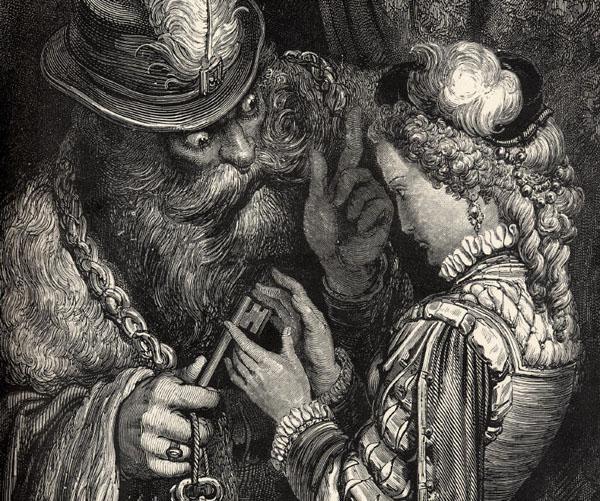
Papal spices
Already in ancient times there was a tradition to add to wine honey and spices. Thus, in the Hippocratic treatise housing "On the secondary fertilization» (De superfetatione) we meet the recommendation to give maternity wine with honey and cumin. It is, according to the Hippocratic (or students), to help maternity safely delivered. On behalf of the Latin version of the famous Greek physician - Hippocrates (Ἱπποκράτης, lat. Hippocrates, approx. 460 BC. E. - C. 377 BC. E.), Which is considered medieval winemakers, the first recipe was spiced wine at the unanimous opinion of historians, where the name of the wine "gipokras».
In the Roman Empire, "spicy wine" will soon cease to be a medicinal tinctures, but became what we now call digestives. Recipes of spicy wines contained in the treatise "On the culinary arts» (De re coquinaria), whose authorship is sometimes, but, apparently erroneously, attributed to the famous ancient Roman gourmet Apicius Gabiyu Mark (Marcus Gavius Apicius, ok. I century BC. Oe. ).
The Roman Empire fell, but the tradition of ancient medicine and cooking continued in the empire of Charlemagne (Charlemagne, Carolus Magnus, 742-814). For example, in "chapter house of the estates" - a monument of the Carolingian era (ie the era of Charlemagne), we find mention of "cooked wine» (vinum coctum). Perhaps it is "cooked wine" was the successor of spicy wines of antiquity ...
As the sugar and spices began to find a way into Europe, especially during the Crusades, there were more and more new recipes spicy wines. Many of these recipes, including the addition of the newly opened "burning water" (alcohol), we find in the book "On wines» (De vinis) famous Spanish physician and alchemist Arnold of Villanova (Arnaldus Villanovanus, c. 1240 - c. 1311). Arnold of Villanova suggests adding spices to wine such as black pepper, cinnamon, cardamom, cloves, and sugar, which in those days was considered very expensive and exotic foods.
In his treatise "On the wines' tasting recipes we find to help women become pregnant, as well as increasing the" generative capacity »(potentia generativa) men. Note that the spices and sugar are the main components of these wines. Arnold of Villanova studied and then taught at the University of Montpellier in southern France. Just behind the curtain of scientific career of Arnold the south of France, namely Avignon popes moved. The first pope who moved from Rome to Avignon, was Clement V (Clement V, Raymond Bertrand de Got, 1264-1314), who patronized Arnold and appointed him as his personal physician.
Spices penetrated into Europe during the Middle Ages, very slowly, they cost much, and they attributed magical properties. The wine with cinnamon, star anise or anise was not only pleasant to the taste, but, as stated, increased virility. Photo (SXC license): Jozsef Szoke
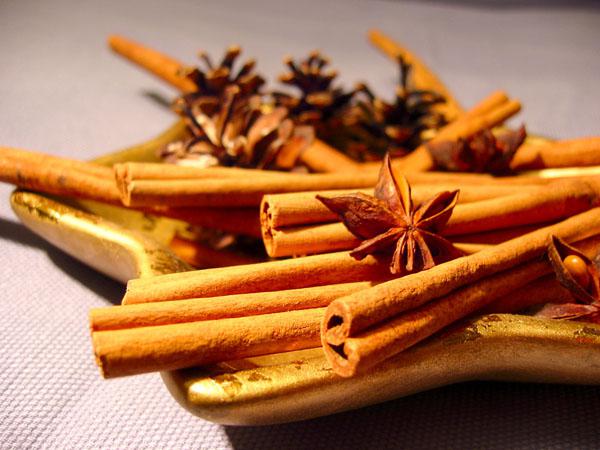
This situation has allowed the Spanish alchemist, came to the attention of the Inquisition, to avoid big trouble. It is interesting to note that Clement V was himself a famous winemaker, when he was still archbishop of Bordeaux, he has become famous for its wine, which today bears his name Château-Pape-Clement, and falls into the category of "Great Wines of Bordeaux» (Grands Vins de Bordeaux). In Avignon he also do what he likes, but the other famous "papal" wine Châteauneuf-du-Pape was the brainchild of his successor, John has XXII (John XXII, Jacques d'Euse, 1249-1334).
From Montpellier recipes spicy wine spread to the north. In Paris, in 1393 came the book "Paris householder» (Le Ménagier de Paris). In it we find references to two spicy wines and claret gipokras - with detailed recipes for their preparation and indicating when and under what circumstances they should serve. The names of these wines more mysterious, but most modern historians believe that "claret" (not to be confused with the same Bordeaux wine) comes from the Latin word claretus (enlightened), so that when the honey and spices mixed in wine, it becomes dull and needs to be filtered that it is "lit».
As gipokrasa - that we have already noted, this name comes from the Latin name of one of the famous Greek physician Hippocrates. According to the recipe driven, "a householder Paris' main ingredients gipokrasa and claret were the sugar, cinnamon, pepper melegetsky or" grains of paradise »(grana Paradisi), galangal, nutmeg, cloves, ginger, as well as" the best Burgundy. " Claret, according to embodiments of the menu, which we find in the "Paris of the householder," before the meal was served as an appetizer, and gipokras - after a meal as a digestif. Curiously, the same "Paris householder" recommends gipokras drink as a wedding honeymoon.
Island aphrodisiac
Over time, the glory of a wonderful wine penetrated to England. One of the largest aristocratic England of the first half of the XV century - Humphrey of Lancaster Duke of Gloucester (Sir Humphrey of Lancaster, 1st Duke of Gloucester, 1390-1447), participant of the battle of Agincourt (1415) and regent of England, had as its steward of a John Russell, who, after the death of the holder stated secrets ducal kitchens in the poem "The Book of power» (Boke of Nurture), written in Old English. In the poem, there is also a recipe gipokrasa. It is interesting that John Russell brings two versions recipe: one for the distinguished persons, and the other - for the common people. The main difference is that for the nobles gipokras made on the basis of sugar, and for simple - on the basis of honey. After the sugar at the time was a very expensive product.
For the accuracy of historical reconstruction of a modern knight tournament supposed to drink spiced wine from a tin cup. Photos (Creative Commons license): Alan Ellis
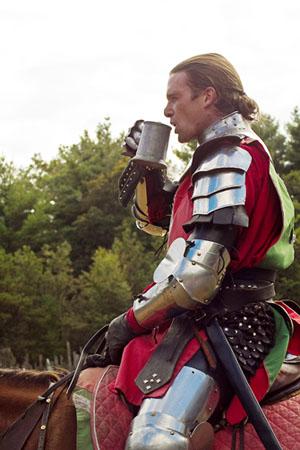
Another scene from the English life associated with gipokrasom refers to 1465, when the inauguration of the Archbishop of York, George Neville (George Neville, archbishop of York, 1432-1476) has been absorbed by the fantastic number of products (4,000 pigeons 2000 chickens, 400 pigs, 113 bulls and so. d.). Mentioned in the list of products and pipe («pip") gipokrasa (pip - unit is approximately 480 l).
Popularity gipokrasa in England indicates that, as often happens in history, the country not only fight, but also share their experiences. That gipokras a result of the Hundred Years War, the British appeared on the tables.
In the XVI century alchemist Italian Girolamo Rushelli (Girolamo Ruscelli, 1520-1566), who wrote under the pseudonym Alexius Pedemontanus (Alexius Pedemontanus), in his book "On the secrets» (De secretis) leads gipokrasa his recipe, however, is not much different from that that we find in the "Paris of the householder" or "Book of the power." The book "On Secrets" was printed in 1561 in Lyon in Latin.
On the famous wine and wrote no less famous Francois Rabelais (François Rabelais, 1494-1553). One of the chapters of his "Gargantua and Pantagruel" is called "On how Rondibilis horn announces a natural application for marriage." One of the characters exclaims:
Or maybe you want another sip of fragrant white (Hippocras blanc)? Do not be afraid, inflammation glands from it can not be. There is not skvinanti or ginger or grains of paradise. It is a blend of selected cinnamon, sugar and samoluchshego devinerskogo glorious white wine.
It is worth mentioning that the writer himself at one time studied at the Medical Faculty of the University of Montpellier, where he once taught us above mentioned Arnold of Villanova. Under the name of the doctor Rondibilisa Rabelais brought his schoolmate and later a professor of medicine, Rondelet Guillaume (Guillaume Rondelet, 1507-1566).
Machiavellian feasts
Gipokras indirectly plays a role in the play a love drink Niccolo Machiavelli (Niccolò di Bernardo dei Machiavelli, 1469-1527) «Mandrake." The plot of the play is very confusing. The hero of the play Callimachus in love with a young and pious married woman named Lucretia. Lucretia childless, her husband longed for a child, and Kallimaha born cunning plan. He was disguised as a doctor creeps into the credibility of the husband of Lucretia, and persuades him to get his wife to take a very effective cure for infertility: tincture of mandrake (hence the title of the play).
Gipokrasa recipe from cookbook «Forme of Cury», published in 1791 by antiquarian Pedzhem Samuel (Samuel Pegge, 1704-1796) from the original 1390
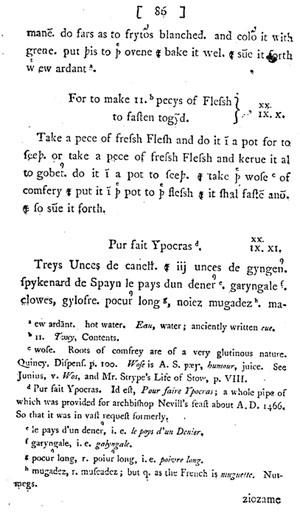
Fragrant mandrake roots for centuries been the most important ingredients of love drinks, and the fruits of mandrake called "love apples." Callimachus further argues that this drug works so that after drinking the intimacy with his woman a man is doomed to die, and the woman will certainly become pregnant. The husband believed the deceiver. Further, as the reader has already guessed, dressed Callimachus was in the role of "victims of the terrible poison", but instead of the drug mandrake he slipped the husband of Lucretia is not nothing but a gipokras.
References to gipokrase continue to meet in the documents of the XVII century. For example, in "Memoirs of Madame de Mottvill of Anne of Austria and her court" we read:
To keep a good face [a bad game] she [Anne of Austria] ordered to bring us a bottle of gipokrasa we drank in her presence.
And here is the famous scene from the novel by Alexandre Dumas (Alexandre Dumas, 1802-1870) «Twenty years later," about the same times:
D'Artagnan entered the pub on the corner of St. Eligius and streets Loschilschikov and asked mulled wine. In the preparation of the drink required a good half hour.
The reader probably already guessed myself, that in the French text of the novel instead of "mulled wine» - «hypocras», ie gipokras
It's time to oblivion
Over time, the glory gipokrasa subsided, and references to it we hardly find throughout XVIII-XX centuries. This probably happened due to the fact that as a "love drink" gipokras was supplanted champagne, which has gained immense popularity, including as a drink of happy lovers, in the second half of the XVII century, when the fashion came in sparkling champagne.
English playwright George Eteredzh (Sir George Etherege, 1635? -1692) In the play "She would if she could» (She Would if She Could), written in 1668, puts into the mouth of one of the heroes of the following remark:
Drink this bottle of sparkling champagne, it will be for you a love drink.
In another play "Fashionable man» (The Man of Mode, 1667), singing champagne, he wrote even more clearly:
Sparkling champagne soon invigorates tired of the poor lovers, sporting and makes us happy and drowns all sadness.
Regent of the Kingdom of France under Louis XV underage Philippe Duke of Orleans has surrounded himself with the ladies of high position and cheerful behavior and after "the labor of the working day" arranged the night with champagne receptions at the Palais-Royal, where his mistress depicted ancient Greek goddesses. Note that Louis XIV demanded of a physician from Dijon to the supplied gipokras in Paris, and did not welcome sparkling wine from Champagne, counting bubbles sign of frivolity.
"Sun King" in his love for gipokrasu revealed himself to the usual conservative and already his successor - Louis XV - cheerfully drank champagne, not even thinking about gipokrase. Such is the omnipotence of fashion! French Champagne in combination with German mulled wine gipokras pushed to the margins of history, and so strongly that, as the reader can verify, even translators Rabelais and Dumas refused to use the true name of this once glorious drink.
Vitaly Zadvorniy Ivan Lupandin
here
(ZY-myself: there is an error in the text, I will not comment)
In the Middle Ages, such filters were called "sleeves of Hippocrates." Quite naturally, they were used in the preparation of gipokrasa - because of spices in the wine is much fine litter
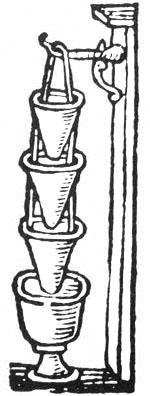
Source:
The companion of Joan of Arc (Jeanne d'Arc, 1412-1431) Marshal of France, Gilles de Rais (Gilles de Rais, 1404-1440) ended his life on the scaffold. The execution was the payback for a long chain of crimes committed by him in his own castle, where he is, according to the investigation, seduced, and then killed his victims. His story was the basis for the legend of Bluebeard. Marshall was accused, among other things, in alchemy, black magic and connections with the devil. And if we are talking about the relationship with the devil, his business, as was customary in the Middle Ages, it took under his special control of the Holy Inquisition. Indictment Marshall takes a lot of pages. A curious detail: one of the charges was that we would call on the modern legal language "alcohol abuse." We read in the indictment:
To initiate a lust accused Giles (Latin spelling Gilles. - VZ, IL) in large quantities consumed wine, known colloquially under the names of claret and gipokras.
Inquisitors were confident that Gilles de Rais in the commission of "sexual abuse of children of both sexes" gipokras used as a love drink. Under torture, Gilles de Rais had confessed to their crimes and was executed in 1440.
About gipokrase now is not just, and remember, although it remarkably long history ...
Gustave Dore Illustration for the fairy tale by Charles Perrault's "Bluebeard". The key is obtained from the evil libertine girl, puts her in a dilemma: either to die or to reveal his terrible secret

Papal spices
Already in ancient times there was a tradition to add to wine honey and spices. Thus, in the Hippocratic treatise housing "On the secondary fertilization» (De superfetatione) we meet the recommendation to give maternity wine with honey and cumin. It is, according to the Hippocratic (or students), to help maternity safely delivered. On behalf of the Latin version of the famous Greek physician - Hippocrates (Ἱπποκράτης, lat. Hippocrates, approx. 460 BC. E. - C. 377 BC. E.), Which is considered medieval winemakers, the first recipe was spiced wine at the unanimous opinion of historians, where the name of the wine "gipokras».
In the Roman Empire, "spicy wine" will soon cease to be a medicinal tinctures, but became what we now call digestives. Recipes of spicy wines contained in the treatise "On the culinary arts» (De re coquinaria), whose authorship is sometimes, but, apparently erroneously, attributed to the famous ancient Roman gourmet Apicius Gabiyu Mark (Marcus Gavius Apicius, ok. I century BC. Oe. ).
The Roman Empire fell, but the tradition of ancient medicine and cooking continued in the empire of Charlemagne (Charlemagne, Carolus Magnus, 742-814). For example, in "chapter house of the estates" - a monument of the Carolingian era (ie the era of Charlemagne), we find mention of "cooked wine» (vinum coctum). Perhaps it is "cooked wine" was the successor of spicy wines of antiquity ...
As the sugar and spices began to find a way into Europe, especially during the Crusades, there were more and more new recipes spicy wines. Many of these recipes, including the addition of the newly opened "burning water" (alcohol), we find in the book "On wines» (De vinis) famous Spanish physician and alchemist Arnold of Villanova (Arnaldus Villanovanus, c. 1240 - c. 1311). Arnold of Villanova suggests adding spices to wine such as black pepper, cinnamon, cardamom, cloves, and sugar, which in those days was considered very expensive and exotic foods.
In his treatise "On the wines' tasting recipes we find to help women become pregnant, as well as increasing the" generative capacity »(potentia generativa) men. Note that the spices and sugar are the main components of these wines. Arnold of Villanova studied and then taught at the University of Montpellier in southern France. Just behind the curtain of scientific career of Arnold the south of France, namely Avignon popes moved. The first pope who moved from Rome to Avignon, was Clement V (Clement V, Raymond Bertrand de Got, 1264-1314), who patronized Arnold and appointed him as his personal physician.
Spices penetrated into Europe during the Middle Ages, very slowly, they cost much, and they attributed magical properties. The wine with cinnamon, star anise or anise was not only pleasant to the taste, but, as stated, increased virility. Photo (SXC license): Jozsef Szoke

This situation has allowed the Spanish alchemist, came to the attention of the Inquisition, to avoid big trouble. It is interesting to note that Clement V was himself a famous winemaker, when he was still archbishop of Bordeaux, he has become famous for its wine, which today bears his name Château-Pape-Clement, and falls into the category of "Great Wines of Bordeaux» (Grands Vins de Bordeaux). In Avignon he also do what he likes, but the other famous "papal" wine Châteauneuf-du-Pape was the brainchild of his successor, John has XXII (John XXII, Jacques d'Euse, 1249-1334).
From Montpellier recipes spicy wine spread to the north. In Paris, in 1393 came the book "Paris householder» (Le Ménagier de Paris). In it we find references to two spicy wines and claret gipokras - with detailed recipes for their preparation and indicating when and under what circumstances they should serve. The names of these wines more mysterious, but most modern historians believe that "claret" (not to be confused with the same Bordeaux wine) comes from the Latin word claretus (enlightened), so that when the honey and spices mixed in wine, it becomes dull and needs to be filtered that it is "lit».
As gipokrasa - that we have already noted, this name comes from the Latin name of one of the famous Greek physician Hippocrates. According to the recipe driven, "a householder Paris' main ingredients gipokrasa and claret were the sugar, cinnamon, pepper melegetsky or" grains of paradise »(grana Paradisi), galangal, nutmeg, cloves, ginger, as well as" the best Burgundy. " Claret, according to embodiments of the menu, which we find in the "Paris of the householder," before the meal was served as an appetizer, and gipokras - after a meal as a digestif. Curiously, the same "Paris householder" recommends gipokras drink as a wedding honeymoon.
Island aphrodisiac
Over time, the glory of a wonderful wine penetrated to England. One of the largest aristocratic England of the first half of the XV century - Humphrey of Lancaster Duke of Gloucester (Sir Humphrey of Lancaster, 1st Duke of Gloucester, 1390-1447), participant of the battle of Agincourt (1415) and regent of England, had as its steward of a John Russell, who, after the death of the holder stated secrets ducal kitchens in the poem "The Book of power» (Boke of Nurture), written in Old English. In the poem, there is also a recipe gipokrasa. It is interesting that John Russell brings two versions recipe: one for the distinguished persons, and the other - for the common people. The main difference is that for the nobles gipokras made on the basis of sugar, and for simple - on the basis of honey. After the sugar at the time was a very expensive product.
For the accuracy of historical reconstruction of a modern knight tournament supposed to drink spiced wine from a tin cup. Photos (Creative Commons license): Alan Ellis

Another scene from the English life associated with gipokrasom refers to 1465, when the inauguration of the Archbishop of York, George Neville (George Neville, archbishop of York, 1432-1476) has been absorbed by the fantastic number of products (4,000 pigeons 2000 chickens, 400 pigs, 113 bulls and so. d.). Mentioned in the list of products and pipe («pip") gipokrasa (pip - unit is approximately 480 l).
Popularity gipokrasa in England indicates that, as often happens in history, the country not only fight, but also share their experiences. That gipokras a result of the Hundred Years War, the British appeared on the tables.
In the XVI century alchemist Italian Girolamo Rushelli (Girolamo Ruscelli, 1520-1566), who wrote under the pseudonym Alexius Pedemontanus (Alexius Pedemontanus), in his book "On the secrets» (De secretis) leads gipokrasa his recipe, however, is not much different from that that we find in the "Paris of the householder" or "Book of the power." The book "On Secrets" was printed in 1561 in Lyon in Latin.
On the famous wine and wrote no less famous Francois Rabelais (François Rabelais, 1494-1553). One of the chapters of his "Gargantua and Pantagruel" is called "On how Rondibilis horn announces a natural application for marriage." One of the characters exclaims:
Or maybe you want another sip of fragrant white (Hippocras blanc)? Do not be afraid, inflammation glands from it can not be. There is not skvinanti or ginger or grains of paradise. It is a blend of selected cinnamon, sugar and samoluchshego devinerskogo glorious white wine.
It is worth mentioning that the writer himself at one time studied at the Medical Faculty of the University of Montpellier, where he once taught us above mentioned Arnold of Villanova. Under the name of the doctor Rondibilisa Rabelais brought his schoolmate and later a professor of medicine, Rondelet Guillaume (Guillaume Rondelet, 1507-1566).
Machiavellian feasts
Gipokras indirectly plays a role in the play a love drink Niccolo Machiavelli (Niccolò di Bernardo dei Machiavelli, 1469-1527) «Mandrake." The plot of the play is very confusing. The hero of the play Callimachus in love with a young and pious married woman named Lucretia. Lucretia childless, her husband longed for a child, and Kallimaha born cunning plan. He was disguised as a doctor creeps into the credibility of the husband of Lucretia, and persuades him to get his wife to take a very effective cure for infertility: tincture of mandrake (hence the title of the play).
Gipokrasa recipe from cookbook «Forme of Cury», published in 1791 by antiquarian Pedzhem Samuel (Samuel Pegge, 1704-1796) from the original 1390

Fragrant mandrake roots for centuries been the most important ingredients of love drinks, and the fruits of mandrake called "love apples." Callimachus further argues that this drug works so that after drinking the intimacy with his woman a man is doomed to die, and the woman will certainly become pregnant. The husband believed the deceiver. Further, as the reader has already guessed, dressed Callimachus was in the role of "victims of the terrible poison", but instead of the drug mandrake he slipped the husband of Lucretia is not nothing but a gipokras.
References to gipokrase continue to meet in the documents of the XVII century. For example, in "Memoirs of Madame de Mottvill of Anne of Austria and her court" we read:
To keep a good face [a bad game] she [Anne of Austria] ordered to bring us a bottle of gipokrasa we drank in her presence.
And here is the famous scene from the novel by Alexandre Dumas (Alexandre Dumas, 1802-1870) «Twenty years later," about the same times:
D'Artagnan entered the pub on the corner of St. Eligius and streets Loschilschikov and asked mulled wine. In the preparation of the drink required a good half hour.
The reader probably already guessed myself, that in the French text of the novel instead of "mulled wine» - «hypocras», ie gipokras
It's time to oblivion
Over time, the glory gipokrasa subsided, and references to it we hardly find throughout XVIII-XX centuries. This probably happened due to the fact that as a "love drink" gipokras was supplanted champagne, which has gained immense popularity, including as a drink of happy lovers, in the second half of the XVII century, when the fashion came in sparkling champagne.
English playwright George Eteredzh (Sir George Etherege, 1635? -1692) In the play "She would if she could» (She Would if She Could), written in 1668, puts into the mouth of one of the heroes of the following remark:
Drink this bottle of sparkling champagne, it will be for you a love drink.
In another play "Fashionable man» (The Man of Mode, 1667), singing champagne, he wrote even more clearly:
Sparkling champagne soon invigorates tired of the poor lovers, sporting and makes us happy and drowns all sadness.
Regent of the Kingdom of France under Louis XV underage Philippe Duke of Orleans has surrounded himself with the ladies of high position and cheerful behavior and after "the labor of the working day" arranged the night with champagne receptions at the Palais-Royal, where his mistress depicted ancient Greek goddesses. Note that Louis XIV demanded of a physician from Dijon to the supplied gipokras in Paris, and did not welcome sparkling wine from Champagne, counting bubbles sign of frivolity.
"Sun King" in his love for gipokrasu revealed himself to the usual conservative and already his successor - Louis XV - cheerfully drank champagne, not even thinking about gipokrase. Such is the omnipotence of fashion! French Champagne in combination with German mulled wine gipokras pushed to the margins of history, and so strongly that, as the reader can verify, even translators Rabelais and Dumas refused to use the true name of this once glorious drink.
Vitaly Zadvorniy Ivan Lupandin
here
(ZY-myself: there is an error in the text, I will not comment)
In the Middle Ages, such filters were called "sleeves of Hippocrates." Quite naturally, they were used in the preparation of gipokrasa - because of spices in the wine is much fine litter

Source:
The story of the homeless, who had found his family
Medvedev reprimanded for keeping Nikita White Twitter




